 Day 8
Day 8 - We awake in our beautiful Ger tent to a glorious golden morning and a 'backyard' view to die for. I have to say, every single day in Mongolia had blue skies (it really is true, even in Ulaan Baatar as we later find out). After a good breakfast of mongolian rice porridge, lamb fried dumplings and various breads with butter and fresh cranberry jam (
very nice), JD and I take a walk and watch the local boys herd the horses over the hill and into the corral. We stop and listen to perfect silence. After a while we slowly walk back to the camp. There is a lot of horse shit all over (not just around where the horses are kept but everywhere for miles and miles) but after a while you get use to it (they are rather dry clumps and not really offputting) and only avoid the 'fresh' ones.
 Our camp!
Our camp!
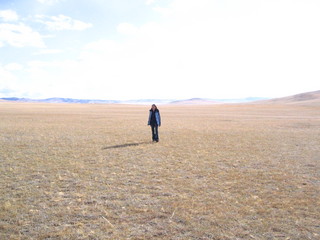

Later that morning, we get ready for our horse ride (5 USD each, very reasonable). We each sign a waiver and are given instructions (always mount the horse with your left foot and bring the other over and shout "chu" to get it to move). We put on our helmets and chaps, gather up a saddle each and make our way to the corral. Apart from our roomies Antony and Theresa, most of us are first timers and very nervous (these things are big). We gather round, looking at the horses and gesturing to the herdsman we all want the smallest ones. Then one by one, the herdsman indicates to us our designated horse and helps us mount it (I have a suspicion they pair horse and rider by personality). The horses are stouter and less elegant than the ones we're used to seeing but extremely tough. They are apparently left outside to fend for themselves even in winter when it gets to about minus 38 degrees. These horses are not fed but left to scratch and scrape for grass themselves (by contrast, the camp owners are building a garage for their car). My horse was milk chocolate brown with thick, short, wiry mane and extremely well behaved whilst JD's was a paler brown colour with a longer mane and as we found out later, terribly obstinate ;P
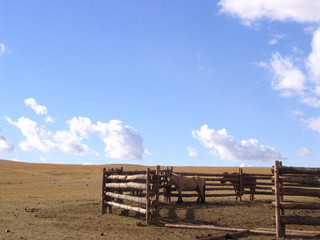 Horses
Horses
 Oozing confidence, obviously
Oozing confidence, obviously Suited up!
Suited up!We all start off rather slow and cautiously, trying to keep balance. The view is breathtaking - there is miles and miles of open plains and nothing between us and the mountains in the horizon. Our horses follow a general direction. My horse having seen some of his mates in the distance (long distance .. his mates were just tiny dots) decides to head off that way before I pull him back towards our group. After the first 45 minutes, with gained confidence, even the most terrified of us start to urge our horses to go faster by shouting "chu". The horses however seem reluctant to respond. One of us, Peter, thinks it's a translation issue and we try various versions ranging from "shoe", "choo" to "shooo". Finally, he settles with "Go Tonto go!". JD's horse trots behind some of ours. He shouts "chuuu" with gusto, only to make
our horses surge forward and some of us (girls) scream in the process. We finally stop at a slight hill and look back at our camp which looks like toy models in the distance. Then our guides head back towards camp and our horses (they know the drill) follow with great speed. I hang on for dear life for the first 30 seconds before finally enjoying the exhilaration of the gallop (standing on the stirrups helps correct your balance btw). My horse is moving so fast I can hear the wind rush past my ears! What a
wonderful life these boys must have!
After lunch we pay a visit to a family living nearby (approx 40 minutes walk). We stop halfway to take pictures of some yaks. Very impressed as it was a real family ( they don't get paid or anything and they certainly weren't expecting us). We bring some biscuits, sweets and a notebook as gifts. Baggi our tour guide helps translate questions and answers from both family and visitors. The couple have 6 children, the eldest 28 and the youngest who was in the tent with them, 10 months. Their children are living in the city - the elder ones working, the teenage boys studying (they come home in weekends to help out with the animals.) It is custom that the youngest child takes care of his parents and carry on the tradition.
 Yaks!
Yaks!
 Family
FamilyThey have 2 ger tents (1 for living and the other presumably for storage - it had some meat hanging inside) and a white car (for ferrying the children to school). A typical ger costs about USD500 and is much better self contained than a caravan I reckon. We were all give some salted milk tea to drink (smelt very sweet and milky, even though it wasn't). Our hosts also offered us some fried curd (looked like sesame paste, very rich in taste), dried curd (looked like soap, tasted awful - bitter, salty and hard) and 'freshly scooped' curd (looked the most gross but actually tasted the best - like rich cream). Apart from milk based foods, I don't think fruit and vege are hot on the menu...
 Mmmm... milk curd anyone?
Mmmm... milk curd anyone?We talk some more and find out that 40% of Mongolia's population are still nomadic. The government encourages this way of life and provide assistance to help them in various ways - e.g. providing solar panels (which allow them to generate electricity for the occasional tv or radio) and satelite dishes (for telephone). The family we visited had about 4000 horses and several thousand sheep. Was calculating - they are really quite wealthy - with each horse worth about USD100, an average family would be sitting on a quite sizeable livestock investment of at leastUSD 400,000. The family also tell us they move about 3-4 times a year in search for pastures and water for their livestock. They would be moving in about 10 days time to winter pastures (which are closer to mountains which would provide some shelter from the winds). Water sources are kept secret as in the past foreign invaders (the chinks, again..) have poisoned their water.
We talk some more, some of us have brought postcards from the UK and show these to the family. JD offers the baby a biscuit and takes it away when the mother makes choking gestures at him. The toddler wasn't impressed. The 10-month old boy can barely walk but already goes on the saddle with his father. Baggi tells us about local customs, one of which is sweeping the broom to indicate to visitors that they are no longer welcome. As if on cue, the boy picks up the broom and we all burst out laughing.
We say our goodbyes and make our way back to camp. We have dumplings for dinner and talk about our day and some more about our Trans Mongolian misadventures (I think we needed to get it out of our system). Someone asks us what made us do the trip and we all start cussing 'bloody Michael Palin' (sorry Michael, we love you really). The nights are so cold it hurts after washing your hands. Brrrrrr!
 Bell Tower
Bell Tower
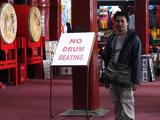

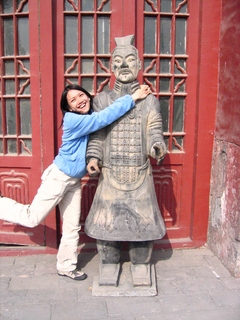
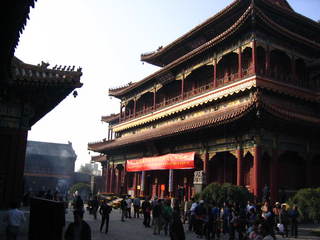

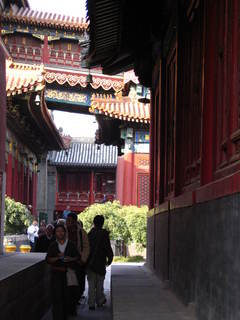





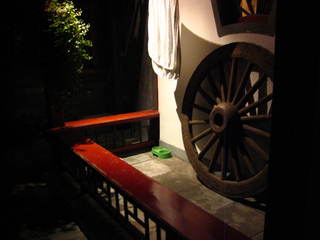








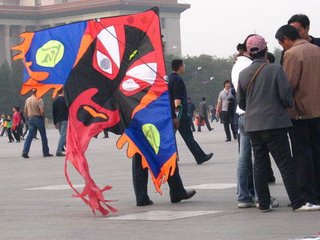




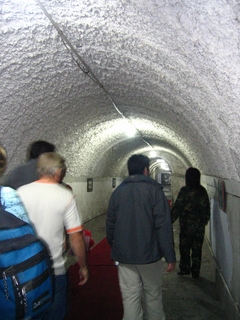








 Isn't she cute?
Isn't she cute?




















